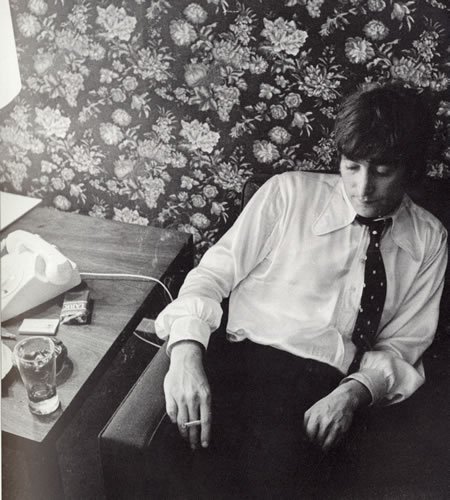usa hates
How John Lennon became public enemy number one
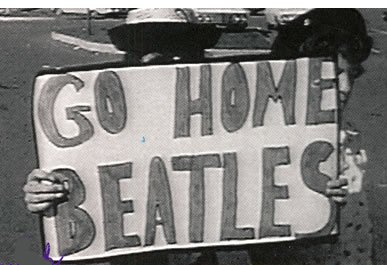
In July, however, an American teen magazine called Datebook quoted the infamous Lennon 'Jesus statement' without reprinting the original article. It appeared as part of a cover story called "The Ten Adults You Dig/Hate the Most."
The American reaction was instantaneous. Radio stations across the country, but especially in the South and Midwest, stopped playing Beatles records. Death threats began pouring in — directed against not only John, but the other Beatles as well. Bonfires appeared
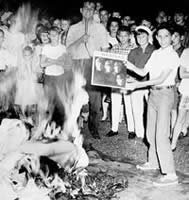
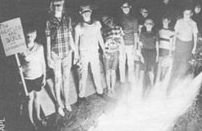
with Beatles pictures and albums providing the fuel. Maureen Cleave tried to explain that "John was certainly not comparing the Beatles with Christ. He was simply observing that so weak was the state of Christianity that the Beatles were, to many people, better known. He was deploring, rather than approving, this," but to no avail.
DJs Tommy Charles and Doug Layton of WAQY in Birmingham — the scene of major civil rights disturbances in the 1960s - were first to pick up on Lennon' s comments and initiate a 'ban-the-Beatles campaign'.
Starke in Florida had the dubious distinction of becoming the first place in the US to actually burn Beatles records, which was significant as the band had helped to desegregate the nearby city of Jacksonville just two years earlier. And there was also conspicuous involvement of the Ku Klux Klan in the campaign against the Fab Four. In South Carolina, for example, the Klan Grand Dragon Bob Scoggins nailed a Beatles record to a large cross and set it on fire. Other Klansmen justified their campaign on the grounds that not only were the Beatles blasphemous, but that they were not really 'white' either.
In Cleveland, the Reverend Thurman H. Babbs threatened to excommunicate any member of his congregation who listened to the Beatles. In the South, the Ku Klux Klan burned the Beatles in effigy and nailed Beatles albums to burning crosses. Finally, on August 11, with a scheduled American tour fast approaching, Lennon held a press conference in Chicago, at which he attempted to make amends.
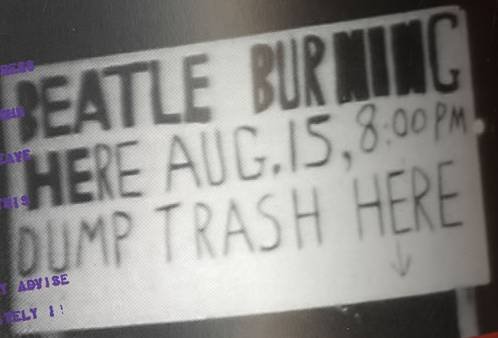
August 11
John meets with American press - attempts to explain what he meant by his "We're more popular than Jesus" remark
In a hotel room on the 27th floor of the Astor Towers Hotel in Chicago where unrelenting pressure from the American press was seeking out a public apology from John Lennon, the Beatle is recorded on film as saying: "If I had said that television is more popular than Jesus, I might have got away with it. It's a fact, in reference to England, we meant more to kids than Jesus did, or religion at that time. I wasn't knocking it or putting it down. I was just saying it, as a fact and it's true, more for England than here. I'm not saying we're better or greater or comparing us with Jesus Christ as a person or God as a thing, or whatever it is, you know, I just said what I said and it was wrong, or was taken wrong, and now it's all this!"
Interestingly, the questions fielded by the press on this very subject alone lasted between 5-10 minutes before moving onto other topics. Tony Barrow, the Beatles personal publicist who had witnessed the event, recalls how John Lennon had reacted to the situation: "The arrival in Chicago was auspicious from John's personal point of view because, that night in the hotel, for the first time perhaps, he personally faced the press....He was taking great responsibility for something he felt terribly bad about and was greatly concerned that this thing, taken completely out of context, should rebound. He did not blame, for instance, Maureen Cleave in the least because of the way he had told it to her. He was concerned that this whole thing could rebound on The Beatles. He was more frightened, really scared stiff, that night, more than at any other time I've seen him, because the whole thing fell on his shoulders."
Tony Barrow's comments are supported by Cynthia Lennon in her book, "A Twist of Lennon": "[I]n an interview John likened the Beatles to Jesus Christ. His truly honest assessment of their popularity offended the God-fearing, clean living Americans who lived in the Bible belt of America. His views were totally misconstrued. John was very bewildered and frightened by the reaction that his words created in the States. Beatle albums were burnt in a mass orgy of self-righteousness indignation. Letters arrived at the house full of threats, hate and venom."
